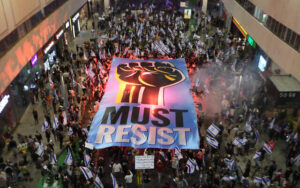The Israeli protest of the privileged

Israelis wave a placard as they protest against the government’s controversial justice reform bill in Tel Aviv on 4 March 2023.
Avshalom Halutz writes in Haaretz on 16 March 2023:
Samaher didn’t vote in the last election. In fact, she has never voted. Instead, she spent the Election Day off at the Jaffa café where she works, and drank a lot of black coffee. Her friends, also Arabs, didn’t vote either. Like Samaher, they did not waver in their decision not to vote.
Even though she’s an opinionated woman, Samaher also isn’t participating in the demonstrations against the government’s planned judicial overhaul. Her Jewish friends tried to understand why she – like most of the Arab community – hasn’t joined such a righteous protest against such a severe threat to Israeli democracy. But she preferred to keep mum and sip her coffee.
Tigist, a young Ethiopian Israeli social activist who lives in Tel Aviv, did vote in the last election, but she, too, has not protested, not even online. These days, she’s busy organizing a new cultural conference and caring for her young son. Like her, many of her Ethiopian Israeli friends and acquaintances are also staying away from the demonstrations on Tel Aviv’s Kaplan Street.
During the “national days of disruption,” Samaher and Tigist stayed far from the center of the action, instead watching the footage of officers throwing stun grenades at angry protesters who broke through police barricades. Even if they had wanted to be present, there is no place for them at the demonstrations.
In order to be able to fearlessly and proudly break through police barricades in a moment of rage, you must first be able to break through older, rustier and much heavier barriers. The protesters come from one large and obvious group. Samaher, Tigist and their friends do not belong to it.
The people involved in this protest of the privileged, this belated kindling, are angry. Most are resolute and impassioned. They see themselves as warriors for justice. But until last week, most were unfamiliar with the fear of being pepper-sprayed, the pain of the water cannons, the torture of handcuffs.
They weren’t there when police mounted on well-groomed horses galloped through a crowd of Ethiopian Israelis in Tel Aviv’s Rabin Square and humiliated them by setting off noisy stun grenades and spraying them with skunk water, even though those demonstrators did little more than sitting in groups and singing around memorial candles. Few of today’s demonstrators marched through the streets of Tel Aviv after the murder in the Bar Noar gay youth club. To them, the poor and hungry senior citizens are completely invisible.
Most of them never fought against the occupation. When the army killed more than 500 children in the Gaza Strip, none of them came to Tel Aviv’s Habima Square to cry out their pain. It was enough for them that Haaretz’s Amira Hass wrote articles they could share. They didn’t even have to read them first.
The disruption they are engaged in now, for all its importance, doesn’t prove the daring of its participants. Rather, it reveals the intolerable ease with which it emerged from the vacuum that preceded it. Every rally, every march and every disruption that takes place now makes the ghosts of all the protests that preceded them – the ones that never took place – echo more loudly.
As people used to surviving in a divided, competitive, inequitable society, most Israelis are so preoccupied with a concerted effort to accumulate personal power and forge connections with the power centers that they have virtually forgotten anyone beside themselves. Even people similar to them don’t interest them too much.
Likud MK Tsega Melaku was a guest in the Kan public broadcaster’s news studio recently. She said something nobody was willing to hear. “When it was about Ethiopian Israelis, we didn’t hear from you,” she said, as the other panel participants kept rudely interrupting her. “Demonstrations are a legitimate democratic tool, but we didn’t hear these statements during the Ethiopian Israelis’ demonstration. Even the media turned us into criminals. We didn’t hear this when our young people were being beaten. Some are in jail to this day. The fact is that you don’t see us – you don’t see Blacks – at today’s demonstrations, because at that time, nobody paid attention to us.”
There has recently been a widespread phenomenon known as “quiet quitting” in the United States. Workers don’t leave exploitative or poisonous workplaces; instead, they shift into low gear, produce less, prefer to do as little as possible. Nobody should be surprised now by the quiet social quitting of all the people whose distress the Israeli consensus preferred not to see or hear. It excluded them, ignored them, left them out in the cold.
These protests are meant first and foremost to preserve the illusion we have grown so used to, the delicate but convenient status quo of the blind consensus. But even when it is angry and disruptive, the consensus remains blind.
This article is reproduced in its entirety
